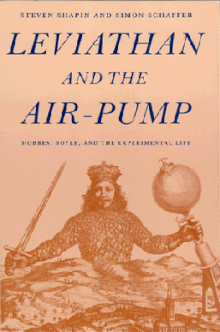Leviathan and the Air-Pump
 |
|
| Author | Steven Shapin and Simon Schaffer |
|---|---|
| Country | United States |
| Language | English |
| Publisher | Princeton University Press, Princeton, New Jersey |
|
Publication date
|
1985 |
| Media type | |
| ISBN | |
| OCLC | 21974013 |
| 533/.5 19 | |
| LC Class | QC166 .S47 1985 |
Leviathan and the Air-Pump: Hobbes, Boyle, and the Experimental Life (published 1985) is a book by Steven Shapin and Simon Schaffer. It examines the debate between Robert Boyle and Thomas Hobbes over Boyle's air-pump experiments in the 1660s. In 2005, Shapin and Schaffer were awarded the Erasmus Prize for this work.
On a theoretical level, the book explores the acceptable methods of knowledge production, and societal factors related to the different knowledge systems promoted by Boyle and Hobbes. The "Leviathan" in the title refers to Hobbes's book on the structure of society, Leviathan, or The Matter, Forme and Power of a Common Wealth Ecclesiasticall and Civil and the "Air-Pump" refers to Robert Boyle's invention. The book also contains a translation by Schaffer of Hobbes's Dialogus physicus de natura aeris. It attacked Boyle and others who founded the society for experimental research, soon known as the Royal Society.
Shapin and Schaffer state, in their first chapter Understanding Experiment, that they wish to answer the question, "Why does one do experiments in order to arrive at scientific truth?" Their aim is to use a historical account of the debate over the validity of Boyle's air pump experiments, and by extension his experimental method, to discover the origins of the credibility that we give experimentally produced facts today. The authors wish to avoid "'The self-evident'" method, which (they explain) is when historians project the values of their current culture onto the time period that they are studying (in this case valuing the benefits of empiricism). They wish to take a "stranger's" viewpoint when examining the debate between Hobbes and Boyle because, in the 1660s, both methods of knowledge production were well respected in the academic community and the reasons that Boyle's experimentalism prevailed over Hobbes's natural philosophy would not have been obvious to contemporaries.
They explain that, traditionally, Hobbes's position on natural philosophy has been dismissed by historians because historians perceived Hobbes as "misunderstanding" Boyle's work. Thus, in Leviathan and the Air-Pump, Shapin and Schaffer aim to avoid bias and consider both sides' arguments with equal weight. In addition, they comment on the social instability of Restoration society post-1660. They aim to show that the debate between these two contemporaries had political fallout beyond the intellectual sphere, and that accepting Hobbes or Boyle's method of knowledge production was also to accept a social philosophy.
...
Wikipedia
